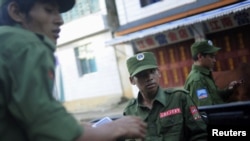Myanmar's most powerful ethnic minority militia has made a rare invitation to insurgent groups negotiating peace with the government to meet at its headquarters, a member of the team negotiating with the government said on Tuesday.
Myanmar's complicated ethnic minority politics have been a source of strife for decades and remain a potential flashpoint as the country emerges from decades of strict military rule.
The militia force, the United Wa State Army (USWA), operates in northeastern Myanmar's Shan State and controls zones on both the Chinese and Thai borders.
The group was formed after the collapse of Myanmar's communist insurgency in 1989 and has operated under a ceasefire with government forces since then, prospering from various businesses, including drugs, according to the United States, and building up a formidable force.
Despite the ceasefire between the Wa and the army, speculation occasionally builds that government forces will move against the Wa to take control of their zones and eliminate any threat they pose.
The Wa have not been fully involved in the separate peace talks that began in 2013 and resulted last week in a draft nationwide ceasefire between 16 minority factions and the government.
The Wa invitation to some of the factions that signed the draft to gather at their headquarters on the border with China was a mystery, the member of the truce negotiating team said.
“We have to make sure why they called, what their aim is to receive us,” Hkun Okker, a member of the Nationwide Ceasefire Coordination Team, told Reuters.
UWSA officials were not available for comment.
Myanmar's semi-civilian government, which took power in 2011 after 49 years of military rule, has made ending hostilities with the many groups that have taken up arms since independence in 1948 one of its priorities.
The UWSA, which once received support and arms from China, has an estimated 30,000 troops, is led by ethnic Chinese commanders.
Bertil Lintner, an author of several books on Myanmar, said the group maintains close ties with China.
“If the UWSA is offering to hold a summit, then China must be behind it,” he said.
Lintner said China's objectives were not clear but he noted an increase in anti-Chinese sentiment in Myanmar since a conflict erupted in February between government forces and an ethnic Chinese rebel group in the Kokang region, also in Shan State.
The World Food Program said on Tuesday 70,000 people had fled from the fighting in Kokang into China and 8,000 had been displaced inside Myanmar.





